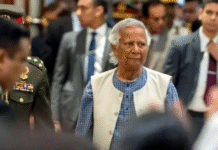On April 12, 2013, the Chief Metropolitan Magistrate Court remanded Mr. Rahman into police custody for 13 days. He is presently detained at the Detective Branch of Police in Dhaka.
At the end of 2012, Mr. Rahman had collected the records of a Skype conversation between former International Crimes Tribunal (ICT) Chairman Justice Md Nizamul Huq and a source located abroad, and had published the transcript of the conversation – in which the judge shared details about the ICT case and asked for advice – thereby raising doubts on the impartiality of the tribunal. Following the eruption of the “Skype scandal” on December 9, 2012 [1], Judge Huq had to resign on December 11, 2012.
Charges were brought against Mr. Rahman for sedition and unlawful publication of the conversation between the ICT judge and an external consultant, under sections 56 and 57 of Cyber Crime and ICT Act-2006 and sections 120(b), 124, 124(a), 505(a) and 511 of the Penal Code.
This is not the first time Mr. Rahman has been intimidated for peacefully exercising his right to free speech as well as his professional freedom as a journalist in Bangladesh. The latter had previously been arrested, ill-treated and unjustly convicted in relation to his human rights activities [2].
FIDH and OMCT fear that he is currently at risk of torture and recall that the authorities have to fulfill their obligations under international human rights law to protect the right not to be subjected to torture or other cruel, inhuman or degrading treatment or punishment.
FIDH and OMCT strongly condemn the arrest of and harassment against Mr. Rahman, which is representative of the increasing repression of dissenting voices in the country, and call on the Bangladeshi authorities to release him as well as other journalists and activists arbitrarily detained.
In the meantime, OMCT and FIDH urge the relevant authorities to guarantee the physical and psychological integrity of Mr. Rahman at all times.









